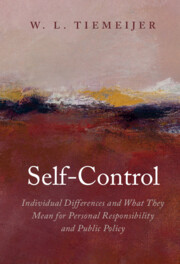 Self-Control
Self-Control Book contents
- Self-Control
- Self-Control
- Copyright page
- Dedication
- Epigraph
- Contents
- Figures
- Tables
- Acknowledgments
- 1 Introduction
- Part I Self-Control
- 2 A Gift for Life
- 3 How Situation Undermines Self-Control
- 4 Building Self-Control?
- 5 The Value of the Future
- 6 The Self-Control Effects of Poverty
- Part II Implications for Society and Politics
- Notes
- Bibliography
- Index
3 - How Situation Undermines Self-Control
from Part I - Self-Control
Published online by Cambridge University Press: 20 August 2022
- Self-Control
- Self-Control
- Copyright page
- Dedication
- Epigraph
- Contents
- Figures
- Tables
- Acknowledgments
- 1 Introduction
- Part I Self-Control
- 2 A Gift for Life
- 3 How Situation Undermines Self-Control
- 4 Building Self-Control?
- 5 The Value of the Future
- 6 The Self-Control Effects of Poverty
- Part II Implications for Society and Politics
- Notes
- Bibliography
- Index
Summary
This chapter explains why no one is perfectly self-controlled, and why even true champions of discipline will sooner or later give in to temptation. The reason is that people are bound by two hardwired constraints: limited working memory and limited mental energy. (Whether the latter constraint actually exists has recently become a subject of fierce debate, but I argue that the critics are mostly mistaken.) This chapter also explains why the capacity for self-control partly depends on the situation. I discuss five factors that may undermine self-control: negative affect, cognitive load, prior exertion of self-control, acute stress, and insufficient sleep. These are factors that all of us experience on a more or less daily basis, meaning that all of us may suffer bouts of poor self-control. To be sure, when the stakes are high, people have mental reserves they can call upon, thus rising to the occasion, but again, there are limits. In the end, no one is immune to self-control failure.
Keywords
- Type
- Chapter
- Information
- Self-ControlIndividual Differences and What They Mean for Personal Responsibility and Public Policy, pp. 38 - 72Publisher: Cambridge University PressPrint publication year: 2022
